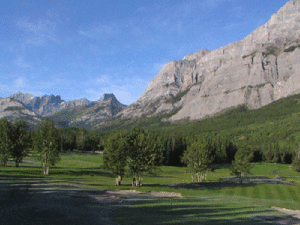Alberta: Difference between revisions
imported>Shawn Goldwater mNo edit summary |
imported>Shawn Goldwater m (→Oil and gas) |
||
| Line 17: | Line 17: | ||
Alberta has long been Canada's principal producer of oil and gas, sparked by the [[Leduc Oil Field]] discovery. | Alberta has long been Canada's principal producer of oil and gas, sparked by the [[Leduc Oil Field]] discovery. | ||
With conventional reserves dwindling, development has shifted to the [[ | With conventional reserves dwindling, development has shifted to the [[Athabasca Oil Sands]], one of the world's largest oil reserves. | ||
Revision as of 13:23, 31 January 2008
Alberta is a western province Canada. Established in 1905, it resides to the north of Montana between the provinces of British Columbia and Saskatchewan. A majority of its population (3,455,062, 2007 est.), live in one of Alberta's two major cities, Calgary and Edmonton.
History
In 1988, Calgary hosted the XV Winter Olympic games.
Geography
Alberta is one of Canada's Prairie Provinces, bounded on the west by the Rocky Mountains. Banff National Park is located in this region and remains Canada's oldest national park.
Government
Provincial politics in Alberta has traditionally been dominated by the ruling Conservative party. Current premier Ed Stelmach assumed office in late 2006.
Oil and gas
Alberta has long been Canada's principal producer of oil and gas, sparked by the Leduc Oil Field discovery.
With conventional reserves dwindling, development has shifted to the Athabasca Oil Sands, one of the world's largest oil reserves.
